Key takeaways:
- Dental emergencies require immediate attention, with common issues including knocked-out teeth, persistent toothaches, and dental abscesses.
- Knowing the initial steps to take, such as rinsing a knocked-out tooth and seeking prompt dental assistance, can increase the chances of saving a tooth.
- It is crucial to recognize signs that warrant a dentist visit, like lingering sensitivity, gum swelling, or lost fillings to avoid serious complications.
- Preventive measures and aftercare, including maintaining proper oral hygiene and regular dental check-ups, can help avoid future emergencies.
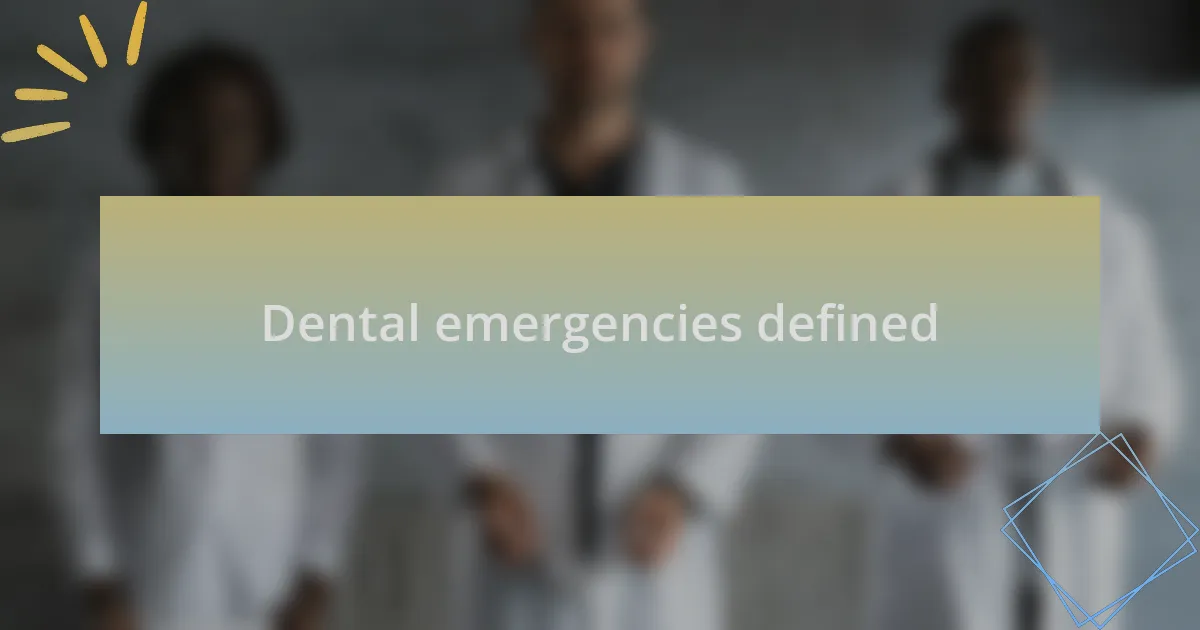
Dental emergencies defined
Dental emergencies can be quite alarming, and they encompass a range of issues that require immediate attention. From a sudden toothache that makes you wince at the thought of eating, to a knocked-out tooth that leaves you in a panic, these situations can be distressing. In my experience, seeing someone in discomfort can often be as jarring as the emergency itself.
Consider a time when a friend of mine had an unexpected dental crisis while on vacation. Amidst the excitement, a tooth broke, and panic set in. It’s moments like these that highlight how vital it is to recognize what qualifies as a dental emergency. Whether it’s severe pain, bleeding, or a lost filling, understanding these signs can mean the difference between saving a tooth and facing more significant consequences.
It’s interesting to ponder: how would you react if a dental emergency struck unexpectedly? Knowing what constitutes an emergency can prepare you for those unsettling moments. Ultimately, being knowledgeable empowers you to take the right steps quickly.
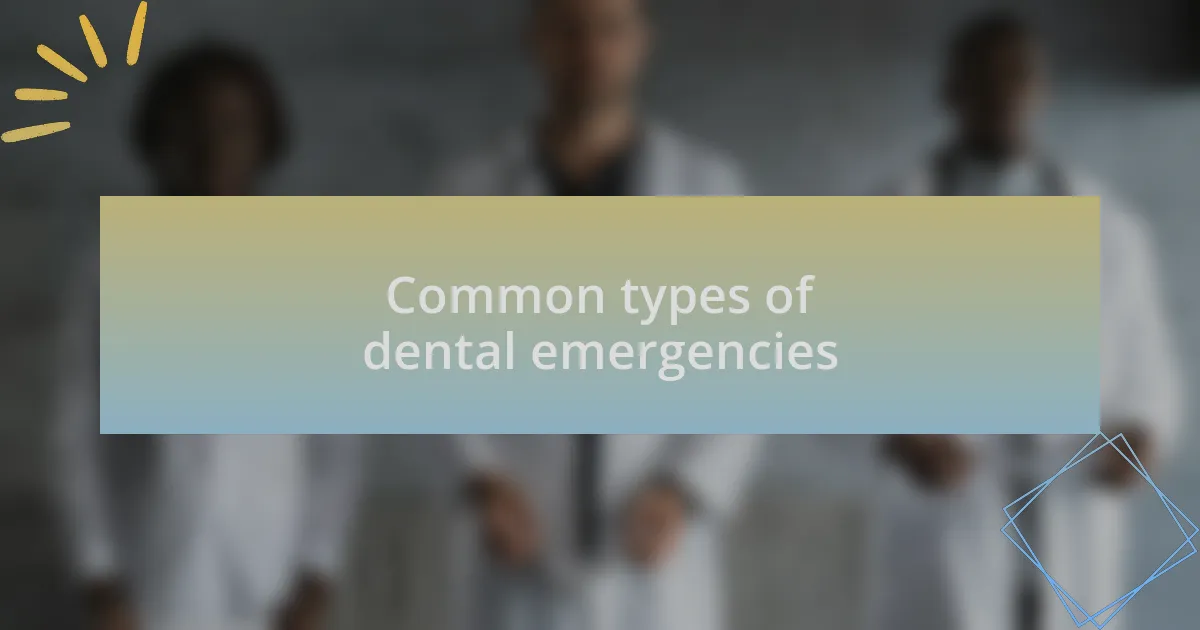
Common types of dental emergencies
One common type of dental emergency is a knocked-out tooth. I still remember when my cousin lost his tooth during a school soccer game. The chaos of the moment was intense, and seeing him doubled over in panic made me realize how immediate the need for action was. If this ever happens to you, remember to handle the tooth by the crown, rinse it gently, and try to place it back in the socket if possible. You need to get to a dentist within an hour for the best chance of saving it.
Another frequent emergency is a persistent toothache. This isn’t just a minor annoyance; it can indicate an underlying problem like an infection. I recall a time when I felt a dull ache that escalated overnight. The throbbing pain made it hard to concentrate on anything else. Recognizing that an unresolved toothache might require immediate dental attention helped me act quickly, preventing a more severe situation.
Then there’s the dreaded dental abscess, a painful swelling that can occur near the gums or teeth. I encountered this firsthand when a friend developed a painful lump—not only was it uncomfortable, but I was also concerned about the potential for an infection spreading. If you notice swelling, fever, or a bad taste in your mouth, it’s crucial to seek help right away. An abscess needs urgent treatment to prevent further complications, and ignoring it can lead to more serious health issues.
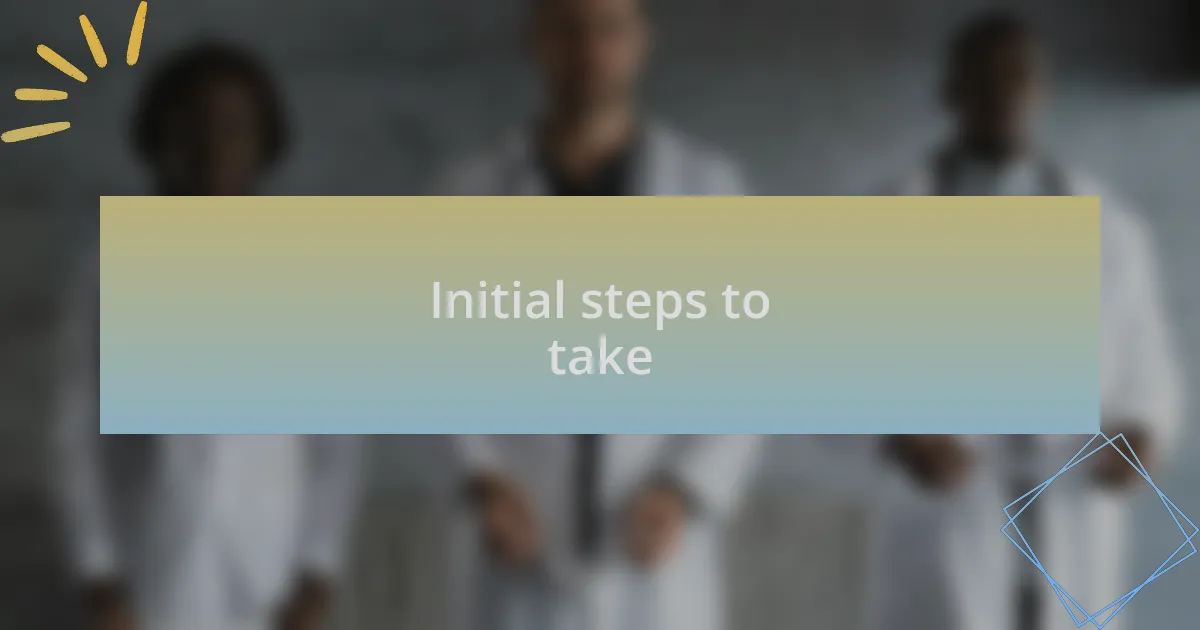
Initial steps to take
When faced with a dental emergency, your first move should always be to assess the situation calmly. I vividly recall a time when my little brother bit down too hard on a piece of candy and cracked a tooth. Instead of panicking, I encouraged him to rinse his mouth with warm salt water to minimize swelling and discomfort. This simple step not only helped soothe his pain but also set the stage for what was next—getting professional help.
If the emergency involves a knocked-out tooth, time is of the essence. I’ve experienced that feeling of urgency when my neighbor’s son lost a tooth during a biking accident. I quickly advised them to find the tooth, handle it carefully by the crown, and store it in a glass of milk until they could see a dentist. Why milk? The calcium helps preserve the tooth’s root until it can be replanted, which is crucial for saving it.
With persistent toothaches or abscesses, it’s important to understand that these aren’t just fleeting issues; they call for immediate action. I remember when my own toothache escalated to a staggering intensity, making me doubt my ability to think clearly. That’s when I learned: don’t delay. Call your dentist as soon as you notice something is off—early intervention can prevent a world of pain and complications down the line. Have you ever experienced an emergency that made you realize the importance of quick action? Trust me, that proactive mindset can make all the difference!
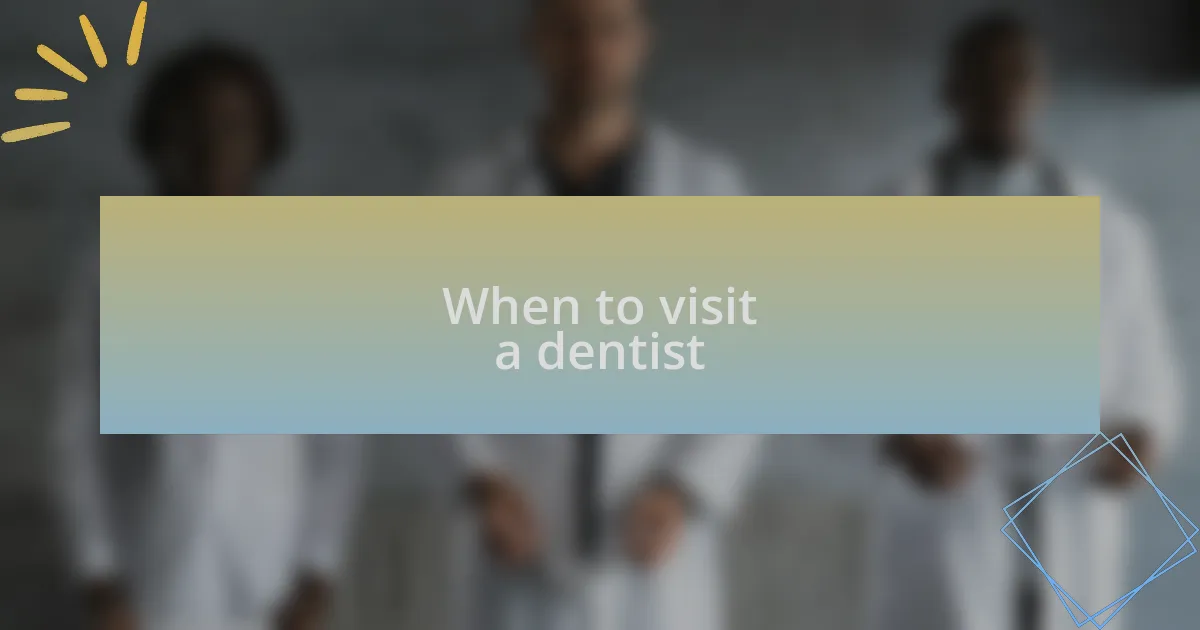
When to visit a dentist
When it comes to selecting the right moment to visit a dentist, there are specific signs I’ve learned not to ignore. For instance, I once experienced a lingering sensitivity in one of my teeth after drinking something hot. That feeling of discomfort never quite went away, which was a clear signal that I needed to schedule an appointment. If you’re facing similar symptoms, consider it your body’s way of waving a flag, urging you to seek professional evaluation.
Another scenario is when you notice unexpected swelling around your gums. I remember a friend who had this issue for weeks, convinced it would resolve on its own. The underlying problem turned out to be an infection that required antibiotics and treatment. If you ever find yourself in a situation where gum swelling is present, act quickly. Ignoring it could lead to more severe complications that are easily avoidable with timely dental care.
Lastly, if you find yourself in the precarious situation of losing a filling or crown, I advise not to wait it out. I recall a day when my filling came loose while enjoying a snack—it was unsettling to say the least! I rushed to my dentist, knowing that allowing it to go unaddressed could lead to further damage. Have you ever thought about the potential consequences of dental neglect? The anxiety of what could worsen is enough to make a solid case for seeking immediate care.
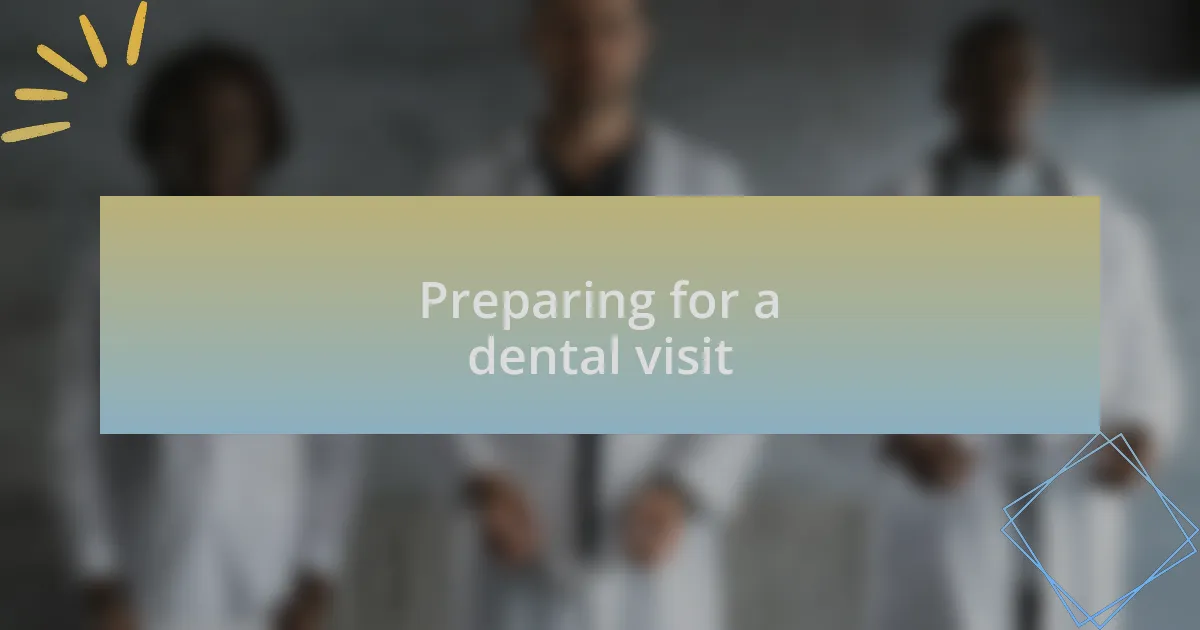
Preparing for a dental visit
Before heading to the dentist, I always find it helpful to gather my essentials to ensure a smooth visit. I learned the hard way that forgetting my insurance details or medication list can lead to unnecessary stress. Have you ever felt that rush of panic when you realize you’re not completely prepared? Taking a few minutes to double-check what I need can make all the difference.
Another thing I recommend is to jot down any questions or concerns ahead of time. This practice came in handy for me when I was puzzled about a specific dental procedure. I remember feeling nervous and uncertain, but having my questions written down made it easier to communicate with my dentist. Wouldn’t you agree that clarity is key to alleviating anxiety before a visit?
Lastly, consider the timing of your appointment. After experiencing a busy schedule, I realized that morning slots work best for me, as I tend to feel fresher and more alert. I also thought about how a weekend visit might pile stress on my mind with thoughts about what lies ahead. Reflecting on your own rhythm can truly help foster a sense of calm before you step into the dental office.
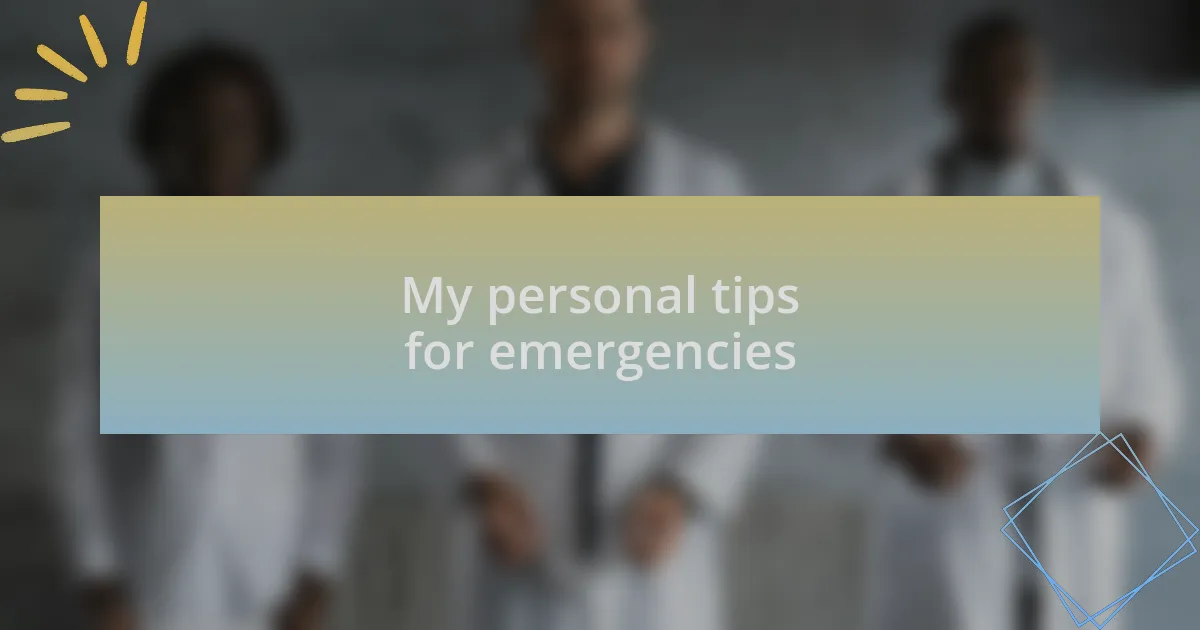
My personal tips for emergencies
When a dental emergency strikes, my first tip is to stay calm and assess the situation. I remember a time when I cracked a tooth while enjoying some popcorn. My initial reaction was panic; however, taking a deep breath helped me think clearly. Ask yourself, can the situation wait for a dental visit, or do you need immediate help? This distinction can help guide your next steps.
If you’re dealing with a knocked-out tooth, I cannot stress enough the importance of handling it properly. I learned this the hard way during a childhood mishap on the soccer field. I carefully rinsed the tooth with water, then gently reinserted it into the socket while seeking emergency care. Did you know that time is of the essence? Getting to the dentist within an hour can significantly increase the chances of saving that tooth.
Lastly, having a dental emergency kit at home is a game changer. I put together mine after I once had a persistent toothache late at night when the clinic was closed. My kit includes a cold compress, dental wax, and even temporary filling material. Have you ever experienced that feeling of helplessness? With a little preparation, you can manage discomfort while waiting for professional help, turning a stressful situation into something a bit more manageable.
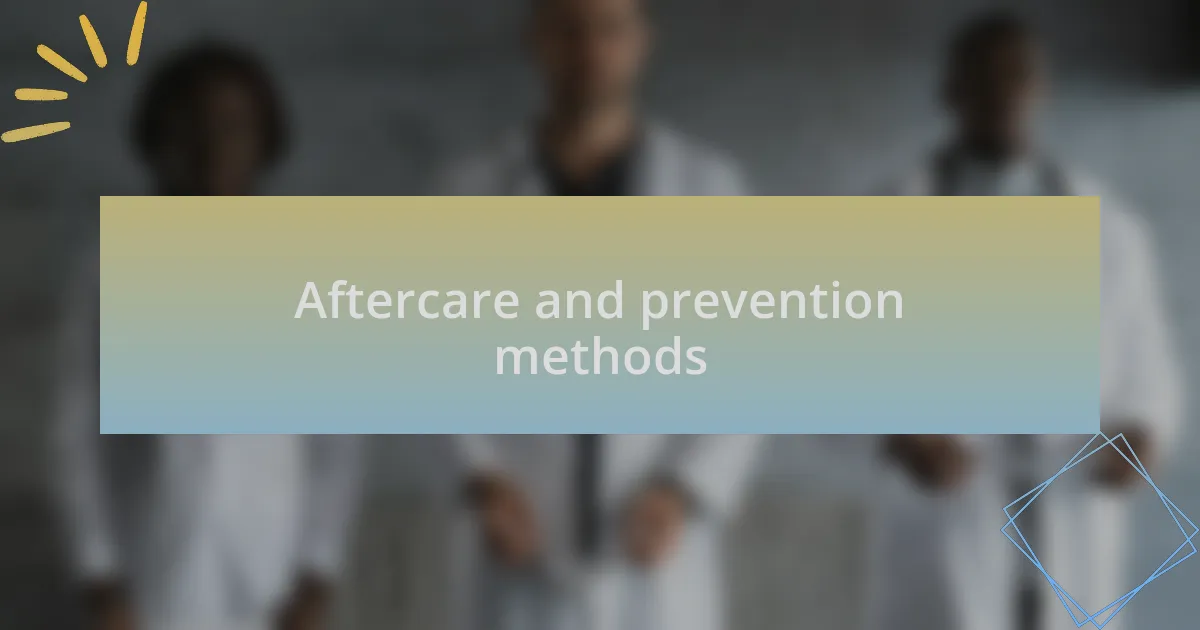
Aftercare and prevention methods
After addressing a dental emergency, aftercare is crucial for promoting healing and preventing further issues. I once had a painful gum infection, and after treatment, my dentist emphasized the need to maintain proper oral hygiene. Flossing and brushing meticulously—to the point where I might feel a bit obsessive—helped prevent any lingering discomfort and allowed me to recover faster. Have you ever realized how small adjustments in your routine can lead to significant improvements?
Prevention methods can make a world of difference in avoiding future emergencies. I remember when I committed to regular dental check-ups after a dental crisis; it was eye-opening to discover that early detection could save me from more significant issues. Isn’t it fascinating how proactive care can empower us? By integrating healthy habits, like limiting sugary snacks and using a mouthguard during sports, we can significantly lower the risk of accidents or damage.
I can’t stress enough how vital it is to listen to your body. After experiencing recurring tooth sensitivity, I learned that ignoring these signs could escalate to emergencies. Trusting my instincts led me to consult my dentist sooner rather than later, and that proactive approach saved me from a much more complex situation. What about you? Are there any signs you’ve noticed that you might be tempted to overlook?